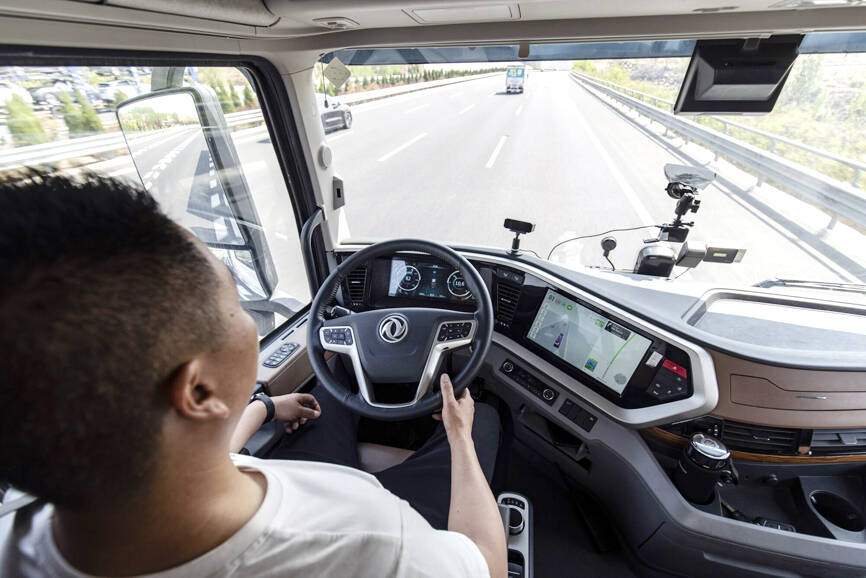The US Department of Commerce is expected to propose a bar on Chinese software in autonomous and connected vehicles in the coming weeks, sources said.
US President Joe Biden’s administration plans to propose a rule that would bar Chinese software in vehicles in the US with Level 3 automation and above, which would also result in a ban on the testing of Chinese-produced autonomous vehicles on US roads.
The administration would also propose barring vehicles with Chinese-developed advanced wireless communications abilities modules from US roads, the sources added.

Photographer: Qilai Shen, Bloomberg
Under the proposal, automakers and suppliers would need to verify that none of their connected vehicle or advanced autonomous vehicle software was developed in a “foreign entity of concern” such as China, the sources said.
Asked for a comment, a department spokesperson on Sunday said that the department “is concerned about the national security risks associated with connected technologies in connected vehicles.”
The department’s Bureau of Industry and Security would propose a rule that “will focus on specific systems of concern within the vehicle. The industry will also have a chance to review that proposed rule and submit comments,” the spokesperson said.
Meanwhile, a representative for the Chinese embassy in Washington said electric vehicles are a globalized industry.
“Only division of labor and cooperation can bring mutual benefits, and only fair competition can bring technological progress,” the representative said. “China urges the US to abide by market principles and international trade rules, and create a level playing field for companies from all countries. China will firmly defend its lawful rights and interests.”
The White House and the US Department of State on Wednesday hosted a meeting with allies and industry leaders to “jointly address the national security risks associated with connected vehicles,” the department said.
The meeting included officials from the US, Australia, Canada, the EU, Germany, India, Japan, South Korea, Spain and the UK who “exchanged views on the data and cybersecurity risks associated with connected vehicles and certain components.”
Also known as conditional driving automation, Level 3 includes technologies that allow drivers to engage in activities behind the wheel, such as watching movies or using smartphones, but only under limited conditions.
A group of US lawmakers in November last year raised concerns about Chinese companies collecting and handling sensitive data while testing autonomous vehicles in the US and asked questioned major Chinese companies.
In letters, the group said that in the 12 months ended November 2022, Chinese autonomous vehicle companies test drove more than 724,205km in California. US Secretary of Transportation Pete Buttigieg in July last year said his department had national security concerns about Chinese autonomous vehicle companies in the US.
The US administration is worried that connected vehicles using driver monitoring systems would listen in on or record conversations of occupants, or take control of the vehicle itself.
“The national security risks are quite significant,” US Secretary of Commerce Gina Raimondo said in May. “We decided to take action, because this is really serious stuff.”

The US dollar was trading at NT$29.7 at 10am today on the Taipei Foreign Exchange, as the New Taiwan dollar gained NT$1.364 from the previous close last week. The NT dollar continued to rise today, after surging 3.07 percent on Friday. After opening at NT$30.91, the NT dollar gained more than NT$1 in just 15 minutes, briefly passing the NT$30 mark. Before the US Department of the Treasury's semi-annual currency report came out, expectations that the NT dollar would keep rising were already building. The NT dollar on Friday closed at NT$31.064, up by NT$0.953 — a 3.07 percent single-day gain. Today,

‘SHORT TERM’: The local currency would likely remain strong in the near term, driven by anticipated US trade pressure, capital inflows and expectations of a US Fed rate cut The US dollar is expected to fall below NT$30 in the near term, as traders anticipate increased pressure from Washington for Taiwan to allow the New Taiwan dollar to appreciate, Cathay United Bank (國泰世華銀行) chief economist Lin Chi-chao (林啟超) said. Following a sharp drop in the greenback against the NT dollar on Friday, Lin told the Central News Agency that the local currency is likely to remain strong in the short term, driven in part by market psychology surrounding anticipated US policy pressure. On Friday, the US dollar fell NT$0.953, or 3.07 percent, closing at NT$31.064 — its lowest level since Jan.

The New Taiwan dollar and Taiwanese stocks surged on signs that trade tensions between the world’s top two economies might start easing and as US tech earnings boosted the outlook of the nation’s semiconductor exports. The NT dollar strengthened as much as 3.8 percent versus the US dollar to 30.815, the biggest intraday gain since January 2011, closing at NT$31.064. The benchmark TAIEX jumped 2.73 percent to outperform the region’s equity gauges. Outlook for global trade improved after China said it is assessing possible trade talks with the US, providing a boost for the nation’s currency and shares. As the NT dollar

The Financial Supervisory Commission (FSC) yesterday met with some of the nation’s largest insurance companies as a skyrocketing New Taiwan dollar piles pressure on their hundreds of billions of dollars in US bond investments. The commission has asked some life insurance firms, among the biggest Asian holders of US debt, to discuss how the rapidly strengthening NT dollar has impacted their operations, people familiar with the matter said. The meeting took place as the NT dollar jumped as much as 5 percent yesterday, its biggest intraday gain in more than three decades. The local currency surged as exporters rushed to